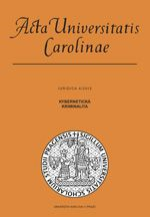Židé v moderní české společnosti: menšina náboženská, národnostní nebo společenství osudu? Většinové pohledy (včetně legislativního) a menšinové...
Jews in a Modern Czech Cociety: Religious Minority, Ethnic Minority or the Community of Destiny? Majority Views (Including Legislative) and...
Author(s): Blanka SoukupováSubject(s): Law, Constitution, Jurisprudence
Published by: Univerzita Karlova v Praze, Nakladatelství Karolinum
Keywords: Jews; assimilation; Zionism; orthodoxy; legislation; anti-Semitism; identity; religiousness; ethnic and language origin
Summary/Abstract: The identity of the Jewish minority in Austria-Hungary, the first Czechoslovak Republic and the so-called Second Republic was formed under different legislative circumstances. The dualism of minority and state-citizenship identity was legally removed by the December Constitution 1867; this was the basis for Jews and their belief becoming equal. The dualism re-emerged after the Munich Treaty (30 September 1938) when anti-Jewish legislation was drafted. In reaction to emancipation the distortion of Jewish tradition accelerated; in addition, the minority was restructured into smaller groups of assimilated Jews (German-Jewish, Czech-Jewish), orthodox Jews and, since the 1890s, national Jews (Zionists). Those changes were performed in reaction to growing Anti-Judaism and Anti-Semitism with their peak between 1897 and 1908. Czech-Jewish assimilates based their position on legislation: they understood their identity as Jewish regarding religion and Czech with respect to nationality. The German cultural identity of Jews co-existed with the identity of the Austrian state, international socialism (similarly to a part of Czech Jews), or it was exclusively German. The multifarious structure of the Jewish minority continued during the First Republic which created quite a liberal context for the life of all minorities (after pogroms in 1918–1920 when the waves of Anti-Semitism raised in 1926, 1929 and after Hitler’s take-over in Germany in January 1933). Czech-Jewish assimilates designated themselves as Czech Jews in order to emphasize a high degree of their assimilation. Jewish identity was fully respected in the First Republic; from the very beginning it was constructed on the fragments of religious tradition or the Jewish style of living. The crisis of the Czech- Jewish movement resulted from ongoing assimilation, international and national political achievements and, in particular, from the atheistic movement which unbalanced the identity of Czechs of Jewish religion. Jewish affiliation confined to family, cultural and ethical tradition. The paper shows that the legislative “definition” of a minority might be in a significant disproportion to the self-assessment of a particular minority, which was the basis for such structured minority to construct its own identity.
Journal: Acta Universitatis Carolinae Iuridica
- Issue Year: 59/2013
- Issue No: 1
- Page Range: 147-158
- Page Count: 12
- Language: Czech

